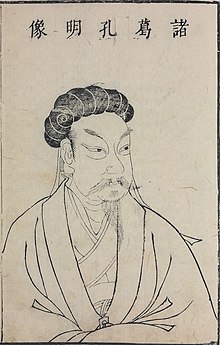Zhuge Liang
| Zhuge Liang | |
|---|---|

Zhuge Liang depicted in the Sancai Tuhui (1609)
|
|
| Chancellor and Regent of Shu Han | |
| Born | 181 Yangdu, Langya Commandery (present-day Yinan County, Shandong) |
| Died | 234 (aged 53) Wuzhang Plains, Shaanxi |
| Names | |
| Traditional Chinese | 諸葛亮 |
| Simplified Chinese | 诸葛亮 |
| Pinyin | Zhūgé Liàng |
| Wade–Giles | Chu-ko Liang |
| Courtesy name | Kongming (Chinese: 孔明; pinyin: Kǒngmíng; Wade–Giles: K'ung-ming) |
| Posthumous name | Marquis Zhongwu (Chinese: 忠武侯; pinyin: Zhōngwǔ Hóu; Wade–Giles: Chung¹-wu³ Hou²) |
| Other names | |
| Zhuge Liang | |||||||||||||||||||||||||||||
| Traditional Chinese | 諸葛亮 | ||||||||||||||||||||||||||||
|---|---|---|---|---|---|---|---|---|---|---|---|---|---|---|---|---|---|---|---|---|---|---|---|---|---|---|---|---|---|
| Simplified Chinese | 诸葛亮 | ||||||||||||||||||||||||||||
|
|||||||||||||||||||||||||||||
| Kongming (courtesy name) |
|||||||||||||||||||||||||||||
| Chinese | 孔明 | ||||||||||||||||||||||||||||
|
|||||||||||||||||||||||||||||
| Transcriptions | |
|---|---|
| Standard Mandarin | |
| Hanyu Pinyin | Zhūgé Liàng |
| Gwoyeu Romatzyh | Ju-ger Lianq |
| Wade–Giles | Chu-ko Liang |
| IPA | [ʈʂúkɤ̌ li̯âŋ] |
| Wu | |
| Romanization | Tsü-keʔ Liang |
| Yue: Cantonese | |
| Yale Romanization | Jyū-got Leuhng |
| Jyutping | Zyu1-got3 Loeng6 |
| Southern Min | |
| Hokkien POJ | Chu-kat Liōng |
| Tâi-lô | Tsu-kat Liōng |
| Transcriptions | |
|---|---|
| Standard Mandarin | |
| Hanyu Pinyin | Kǒngmíng |
| Gwoyeu Romatzyh | Koong-ming |
| Wade–Giles | K'ung-ming |
| IPA | [kʰʊ̀ŋmǐŋ] |
| Yue: Cantonese | |
| Yale Romanization | Húng-mìhng |
| Jyutping | Hung2-ming4 |
| Southern Min | |
| Hokkien POJ | Khóng-bîng |
Zhuge Liang (181 – 234),courtesy name Kongming, was a chancellor (or prime minister) and regent of the state of Shu Han during the Three Kingdoms period. He is recognised as the most accomplished strategist of his era, and has been compared to Sun Tzu, the author of The Art of War. A self-avowed Legalist, he compared himself with Guan Zhong, developing Shu's agriculture and industry to become a regional power. He attached great importance to the works of Shen Buhai and Han Fei, refusing to indulge local elites and adopting strict, but fair and clear laws. In remembrance of his governance, local people maintained shrines to him for ages.
Often depicted wearing a Taoist robe and holding a hand fan made of crane feathers, Zhuge Liang was an important military strategist, statesman and accomplished scholar and inventor. His reputation as an intelligent and learned scholar grew even while he was living in relative seclusion, earning him the nickname "Wolong" or "Fulong" (both literally mean "Crouching Dragon").
Zhuge is an uncommon two-character Chinese compound family name. His name – even his surname alone – has become synonymous with intelligence and strategy in Chinese culture.
Zhuge Liang was born in Yangdu County, Langya Commandery, which is in present-day Yishui, Shandong. Orphaned at a young age, he was raised by his uncle, Zhuge Xuan. Later, he followed his uncle to live in Jing Province, which was governed by Liu Biao.
Zhuge Liang enjoyed reciting Liangfu Yin (梁父吟), a folk song popular in Shandong, his birthplace. He also liked to compare himself to Guan Zhong and Yue Yi, two famous historical figures. He developed close friendships with members of the local literati, such as Xu Shu, Cui Zhouping, Meng Jian and Shi Tao. Zhuge Liang also maintained close relations with other well-known intellectuals such as Sima Hui, Pang Degong and Huang Chengyan. Huang Chengyan once told Zhuge Liang, "I heard that you're seeking a spouse. I've an ugly daughter with a yellow face and dark complexion, but her talent matches yours." Zhuge Liang agreed and married Huang Chengyan's daughter.
...
Wikipedia
